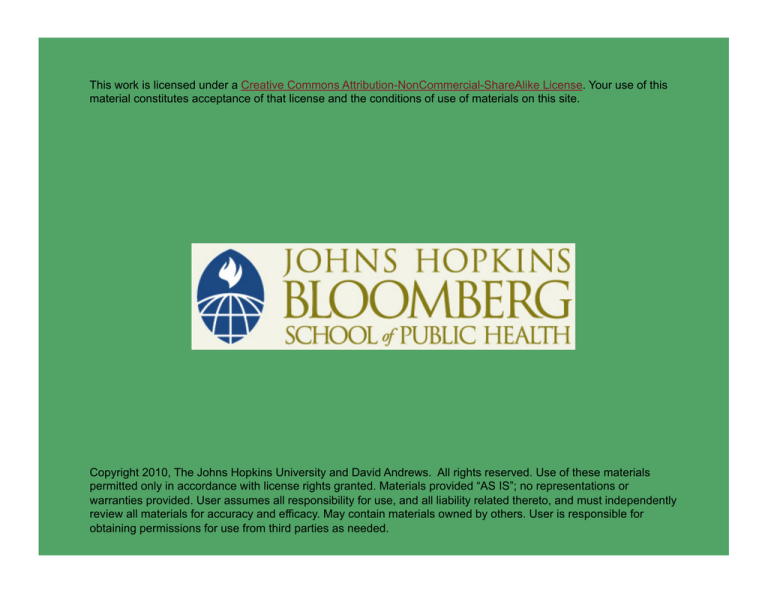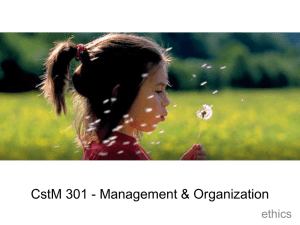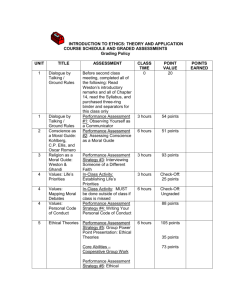
This work is licensed under a Creative Commons Attribution-NonCommercial-ShareAlike License. Your use of this
material constitutes acceptance of that license and the conditions of use of materials on this site.
Copyright 2010, The Johns Hopkins University and David Andrews. All rights reserved. Use of these materials
permitted only in accordance with license rights granted. Materials provided “AS IS”; no representations or
warranties provided. User assumes all responsibility for use, and all liability related thereto, and must independently
review all materials for accuracy and efficacy. May contain materials owned by others. User is responsible for
obtaining permissions for use from third parties as needed.
Eating as a Moral Act
Brother Dave Andrews, CSC
Center for Livable Future
Brother David Andrews, CSC
Former Executive Director, The National
Catholic Rural Life Conference
Peace and Justice Coordinator, The
Congregation of Holy Cross
Board member, consultant, advisor: Heifer
International, Community Food Security
Coalition, National Campaign for Sustainable
Agriculture, Sustainable Agriculture Coalition,
Organization for Competitive Markets,
International Catholic Rural Association,
International Federation of Adult Catholic
Rural Movements, World Food Summit,
International Summit for Sustainable
Development, World Trade Organization,
Agribusiness Accountability Initiative, Sacred
Food Project, United States Conference of
Catholic Bishops’ Domestic Policy Committee
3
Outline
Ethical Considerations for Eating as a Moral Act
Food Production and Food System Issues to Consider
Actions to Achieve Moral Eating
4
Section A
Ethical Considerations for Eating as a Moral Act
Ethical Frameworks
There are a number of ethical frameworks with differing grounds
- Utilitarian ethics: pragmatic, practical, what works
- Religious ethics: based on “being in love”—lovable as basis for
responsibility
- Ethics grounded in reason: intelligent, reasonable—truth as
basis for responsibility
- Ethics grounded in feelings and values: beauty and goodness as
basis for responsibility
I don’t see them necessarily all as unrelated. My integration is of
faith-based, values-based, and rights-based analysis.
6
Eating Is a Moral Act
In 1997, I began a campaign called Eating Is a Moral Act, asking
eaters to think about where their food comes from, how it is
produced, with what effect on the environment, society, the
climate, workers, animals, cultures
This approach questioned from a moral perspective the directions of
industrial agriculture and endorsed sustainable agriculture as a
moral priority. I suggest we all can look at our knives and forks as
levers for social change. They are instruments of ethics.
7
Faith Based Ethical Frameworks
The Sacred Food Project’s eight principles
1. Growing food in ways that protect and heal the web of life
2. Humane treatment of animals
3. Protecting the integrity and diversity of life
4. No one should go hungry
8
Faith Based Ethical Frameworks
The Sacred Food Project’s eight principles
5. Fairness towards and empowerment of workers
6. Responsible and ethical forms of business
7. Food as an aspect of spirituality
8. Reflection on our actions and impacts
9
Values-Based Ethics
Organizations like Heifer International have a values-based approach
in their cornerstones
The cornerstones
- Passing on the gifts
- Accountability
- Sharing and caring
- Sustainability and self-reliance
- Improved animal management
10
Heifer’s Values-Based Ethics
Passing on the gift
- Gender and family focus
- Genuine need and justice
- Improving the environment
- Full participation
- Training and education
- Spirituality
11
Rights-Based Ethics
Many recognize that although faith-based and values-based
approaches differ in their grounding, they can provide the basis for
common efforts
These common efforts can find common ground in a rights-based
approach that can link secular and religious on specific advocacy
efforts
An advocacy effort based on food, farm, and ecology can be an
effective channel for common action and common advocacy
Rights bearers can challenge duty bearers to fulfill their obligations
12
Rights-Based Approach
Articulates a framework that is seen as universal, enshrined in
international law or domestic laws and procedures of fairness
13
The Right to Food
The right to food is a human right, protected under international
human rights and humanitarian law. It has been authoritatively
defined in general comment No. 12 of the Committee on Economic,
Social and Cultural Rights …
- “The right to adequate food is realized when every man, woman
and child, alone or in community with others, has physical and
economic access at all times to adequate food or means for its
procurement.”
14
Right to Food Is a Civil Right
The right to food is a right to a good of order. People have the right
to define their own food and agricultural system.
In some countries this right is enshrined in their constitution
Most countries in the world officially recognize the right to food
15
Eating as Ethical
Eating is related to particular goods
- The quality of the food—whether it causes health or illness,
individual well-being
- The moral choice is between healthy choices and unhealthy
choices
Eating is also related to the goodness or morality of systems—this
goes beyond particular choices to supporting a system
16





